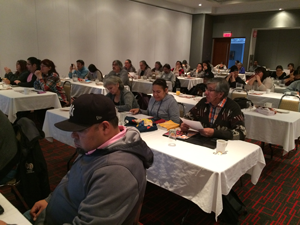
The event which took place in Val-d’Or from January 23rd to 25th, 2018 provided training and information to all the participants on key subjects that are important to improving judicial outcomes and community safety for all Crees.
In total, 44 Community Justice Committee (CJC) Members and Community Justice Officers (CJO) participated to the 3-day symposium that the Department of Justice and Correctional Services recently organized.
Gayle Desmeules, Métis, Master of Arts in Leadership and Training, and a residential school survivor, was invited to discuss Decolonizing our Spirit “Reconciling Relationships. Her workshop explored the meaning of decolonizing our spirit to reconcile and promote healthy relationships.
To heightened awareness, Stella Bearskin made a presentation for the participants on the Public Inquiry Commission on relations between Indigenous Peoples and certain public services in Québec: listening, reconciliation and progress.
On September 15, 2017, the Director of the Department of Justice and Correctional Services, Donald Nicholls, presented on behalf of the Department testimony to the Commission on how to improve services to Indigenous Peoples in Quebec in the justice and corrections systems. It was recorded, and he presented the Commission with a written submission. He was told that the Commission would expand the scope of its mandate and schedule following the testimony. He was accompanied by Denis Blanchette, member of our Judicial Advisory Committee and legal counsel with the Department. These documents could be found at the Commission website.
Participants also heard Mathew Sherrard, a legal counsel to the Cree Government and Department, explain the new Bill 113 on Customary Adoption Regime for Eeyou Istchee. His presentation gave an overview of the new provincial legislation which will come into effect on July 1, 2018. The legislation took many years of negotiations but recognizes the Cree tradition of customary adoption that has happened for generations in the Cree Nation. The new process would not require families to go through court processes to recognize what has been done for many generations. However, in modern society, there are many requirements such as registration for schools, health care and other benefits that need to have a legal recognition, so it is proposed the communities would have a process to recommend customary adoptions and the Department would have a role in informing the government. Mr. Sherrard provided background on this new law, and the next steps in the process including community consultations.
The symposium ended with Robert Auclair, Director of Youth Protection at the CBHSSJB, who was invited to talk about Youth Protection, while Nicolas Bigue and Sabrina Girard, Crown representatives, made a presentation to the CJC members and the CJO on how the Crown process works.


